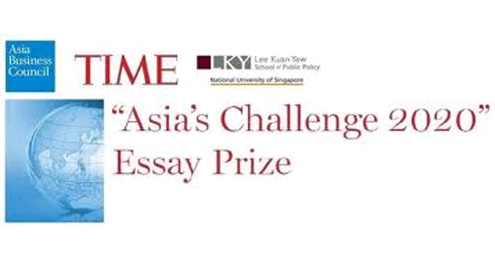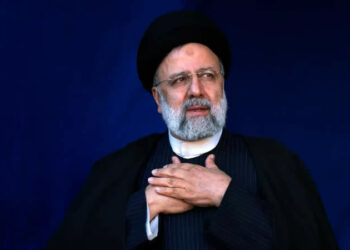 The rising generation of Asians has an expansive view of a broader Asia. They support the pragmatic, incremental pro-market policies that have underpinned Asia’s spectacular growth over the past half-century and want to build on these to knit together the region.
The rising generation of Asians has an expansive view of a broader Asia. They support the pragmatic, incremental pro-market policies that have underpinned Asia’s spectacular growth over the past half-century and want to build on these to knit together the region.
In short, they want to see more regional cooperation and integration. “Rather than thinking about our own personal domains, it’s time to think on a greater scale: the scale of countries, the scale of a continent,” says Pakistan’s Khawaja Ali Zubair. Zubair and other essayists entered the “Asia’s Challenge 2020” contest — run by the Asia Business Council in partnership with Time magazine and the Lee Kuan Yew School of Public Policy at the National University of Singapore — and were tasked with naming the biggest problem facing the region over the next decade and to propose solutions.
Through the Eyes of Tiger Cubs: Views of Asia’s Next Generation draws excerpts from more than 80 essays of the nearly 400 submitted to the contest. The essays tackle education, inequality, demographics, environment, governance, geopolitics and Asian identity. While Americans and Europeans fret about the rise of Asia, the young Asians featured in this book worry about a poor educational system, ineffective governance, bad jobs and environmental degradation. Particularly notable is a tectonic generational shift.
The Tiger Cubs’ grandparents came of age at a time of war, revolution, decolonisation and chronic poverty. Their parents worked hard and didn’t ask questions. For the most part, they were simply happy to be able to work — they were the brains and the muscle for the so-called “Asian miracle,” the half-century of unprecedented economic growth that was built with their blood, sweat and toil. With a handful of exceptions, most Asian countries have settled their existential threats and focused on economic and political development. For the first time, many nations in the region have had an opportunity to think about a larger project of collective identity, and many of their essays call for greater cooperation to resolve the economic, political, immigration and financial challenges that affect the region. Young Asians also want to build on the progress that has been made.
|The Tiger Cubs grew up in an era of unusual peace and unprecedented prosperity. Theirs has been a time of reform, not only in China and India but around the region. They don’t remember Maoism or the Soviet Union. But they know the Internet and satellite TV and live in a world of always-on information. All but the poorest villagers have an idea of a world of prosperity and freedom. They have an idea of the global standard, whether it’s the latest mobile phone or government policies. And they see no reason why their country can’t aim for that standard. “There is no doubt,” writes India’s Rohit Pathak, “that the coming decade will be Asia’s.” But the biggest single stumbling block is poor governance.
Exposed to a flood of media, it’s little wonder that Tiger Cubs’ expectations often run ahead of reality. They are the “in-a-hurry generation” and their demands for accountability, transparency and results are likely to keep challenging governments and companies. It’s easy to say that the Tiger Cubs feel entitled, but it’s less a sense of entitlement than an expectation that life is getting better — and will keep improving. That sense of rising expectations makes the Tiger Cubs primarily supporters of the status quo — essays submitted did not support radical institutional overhaul, let alone calls for revolutionary change. Instead, most of the Cubs want to work through institutions. They believe in the power of governments, and of international bodies, to improve the world.
This belief in states and in regional and multilateral organisations underpins the thinking of many of those who wrote about Asian identity. The need for an Asian currency union was floated, although the writer recognised that this would take decades. Other contestants singled out Hong Kong and Singapore as places where regional organisations could flourish, given the high standards of governance present in both cities.Economic development is the most important element pulling the region together. Decoupling from the West appeared as a theme, but not as a rancorous call. Instead there is recognition that as Asia becomes more developed it needs to look close to home for solutions and continued economic growth.
Asia is extraordinarily diverse and home to the largest number of living languages in the world — more than 2300 are spoken as a first language. Given this diversity, it’s not surprising that many fears remain. Terrorism and low-level conflicts, especially in South Asia, are an on-going issue. Tensions remain between Muslim communities and their neighbours.Young Asians anticipate a future increasingly home-grown, pragmatic, focused on economic and social development. It won’t be anti-West, but it won’t slavishly ape the West. They don’t have a chip on their shoulders about the era of colonial rule and its aftermath. Theirs is an increasingly proud Asia that will slowly build its own institutions. – Khaleejtimes












